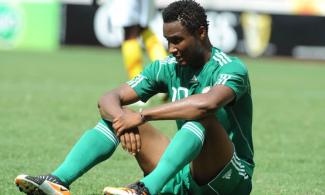
As 2014 ground to a halt, fans and followers of the Super Eagles have had to look back at the last 365 days with disappointment, following an average showing at the World Cup and and a myriad of poor outings in international fixtures, culminating in the team's failure to qualify for the 2015 African Cup of Nations, consequently relinquishing their title even before the first kick of the ball.
For fans and followers of the Super Eagles, the year 2014 must have been a terribly disappointing one. This was a year that began with so much promise. Hopes were quite high, and for good reasons. As of December 2013, the Super Eagles were the reigning champions of Africa. The team had also just qualified, on its own terms at that, for the FIFA World Cup. But as the months progressed, those hopes metamorphosed into disappointment. Nigerians are now left wondering how a year that seemed so heavily pregnant at the beginning, with a lot of good tidings, ended up with a still birth. There are, however, two dimensions from which to solve this riddle-administrative and technical.
googletag.cmd.push(function() { googletag.display('content1'); });
Administratively, things had never been rosy between Chief Coach Stephen Keshi and his employers- the NFF. Not since winning the African Cup of Nations (AFCON) in 2013. Issues of unpaid salaries from 2013 spilled into the year, even as Keshi kept pleading and pressing for the reinstatement of two of his assistants, earlier sacked in a supposed ‘cost-cutting’ measure by the NFF. In the build up to the world cup, the composition of Keshi’s provisional and final lists didn’t go down well with the NFF, as did his outright rejection of a proposed technical study group. At the world cup proper, the Super Eagles boycott of a day’s training session in protest against unpaid remunerations proved to be the final nail on the coffin, with the feeling in the NFF being that, Keshi, as Chief Coach and the ‘Big Boss’ of the players, should have done more to prevent the show of shame. At that point, it was clear that both parties couldn’t wait to get rid of each other as shown by Keshi’s retirement immediately after the France match, a decision he later rescinded.
Nigerians who looked to a new era of peace and progress after the World Cup were left in shock as the post-World Cup era came with bigger problems of its own; problems that reduced Keshi’s issues with his employers to mere child’s play. In the four months that followed the World Cup, Nigerian football was reduced to a pathetic tale of arrests, litigations and counter litigations, elections and counter elections and incessant threats of a ban by FIFA as the Chris Giwa group and some members of the outgoing Aminu Maigari-led board engaged in a hot tussle for leadership of the NFF. All this while, Keshi’s status as national team coach was uncertain. Thus, by the time the Eagles tackled Congo in the qualification series of the AFCON 2015, the team was on an irreversible decline down the steepest of slopes to the bottom rungs of African football, a decline effectively sealed by the 2-2 draw with South Africa in November.
From the technical dimension, things were equally as bad on the pitch, where Stephen keshi reigned supreme, as they were off it. As chief strategist and tactician, it was his responsibility to select the players to execute his plans and tactics. Yet some of his calls left even his staunchest supporters bewildered. His resolve to stick with Chigozie Agbim in goal during the CHAN tournament in South Africa, in January, despite glaring inadequacies, was only one of many. For every Michael Babatunde, Bright Dike, Sunday Mba and Godfrey Oboabona that paid off in his endless experimentations, there was a corresponding Michael Uchebo, Shola Ameobi, Azubuike Eguekwe and Gabriel Reuben that underwhelmed, yet remained constant factors in the team. His consistent loyalty to inconsistent players was legendary, and it was no surprise when the fire of competition he so brilliantly ignited in the early months of his reign went up in smokes, filling the team with a choking air of banality and predictability, and robbing the team of two key psychological weapons in modern day football- the fear factor and the surprise factor.
googletag.cmd.push(function() { googletag.display('content2'); });
Despite his impressive feats of winning an AFCON tournament and equaling our best ever world cup performance, Stephen Keshi spent 2014 completing a very successful 360-degree turn to return the team to exactly the same spot from where he took over, some three years ago.The immediate future remains uncertain. Keshi’s official status as Chief Coach remains unresolved. His release by the NFF after the victory against Sudan in October was rescinded following interventions from the highest office in the land. In this scenario, it is hard to imagine the NFF standing its ground.
Consequent to their failure to qualify for AFCON 2015, the non-defending champions have no major international engagement for 2015, save for friendly matches during FIFA windows. 2015 then presents a good opportunity to stylishly rebuild the team by discarding consistent non-performers, involving capable replacements and strengthening a tight unit of highly motivated and ambitious players with a fearsome winning mentality. This is on the condition that, Stephen Keshi, or whoever takes over, sees the need to do things differently and that the needless rancor that polluted the working relationship between the coach and the NFF, for much of last year does not rear its ugly head.
Otherwise, twelve months from now, Nigerians would have no choice but to reopen the book of lamentations. They deserve to be spared that agony.
googletag.cmd.push(function() { googletag.display('comments'); });